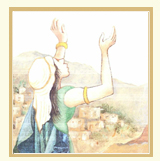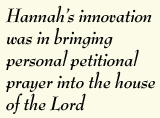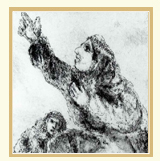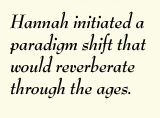Hannah Turns to Prayer
The agony caused by infertility pushed Hannah to make a bold move. Her state of utter loneliness and yearning for deliverance catapulted her to go alone to the House of the Lord and pray. In Hannah’s world a woman entering the House of the Lord alone was not acceptable behavior. However, in desperation Hannah entered and poured out her heart. She said aloud all that had been left unspoken.
After they had eaten and drunk at Shiloh, Hannah rose. The priest Eli was sitting on the seat near the doorpost of the temple of the Lord. In her wretchedness, she prayed to the Lord, weeping all the while, and made this vow:
“O Lord of Hosts, if You will look upon the suffering of Your maidservant and will remember me and not forget Your maidservant, and if You will grant Your maidservant a male child, I will dedicate him to the Lord for all the days of his life; and no razor shall ever touch his head.”
As she kept on praying before the Lord, Eli watched her mouth. Now Hannah was praying in her heart; only her lips moved, but her voice could not be heard. So Eli thought she was drunk. Eli said to her, “How long will you make a drunken spectacle of yourself? Sober up!” And Hannah replied, “Oh no, my Lord! I am a very unhappy woman. I have drunk no wine or other strong drink, but I have been pouring out my heart to the Lord. Do not take your maidservant for a worthless woman; I have only been speaking all this time out of my great anguish and distress.” “Then go in peace,” said Eli, “and may the God of Israel grant you what you have asked of Him.” She answered, “You are most kind to your handmaid.” So the woman left, and she ate, and was no longer downcast.
(1 Sam 1:9–18)
Innovations of the Heart
Initially Hannah was silent, her pain expressed only through tears. When we first hear her voice, it is in prayer, beseeching God sotto voce to see her pain, remember her and grant her children. Hannah is confronted by Eli, the High Priest. He accuses her of drunkenly profaning the sanctuary. This is a surprising allegation—why would Eli suspect Hannah, a woman praying, of being inebriated?
Eli was a cultic functionary; in his eyes, prayer in the sanctuary was to be proclamational, comprised of triumphant declarations of the sovereignty of God, as is the case with many of the chapters in the Book of Psalms that were clearly intended for ritual recitation in the Temple. Even so, he knew there were other forms of prayer: the Torah records Moses’ personal petitions for Miriam’s healing and for his own entry into the Promised Land; the Book of Judges tells of Samson’s calling out to God, and being answered. However, what neither Eli nor the rest of Israel had seen before, was Hannah’s innovation in bringing personal petitional prayer into the House of the Lord.
Motivated by her deep maternal need and by a strong belief in God’s mercy, Hannah initiated a paradigm shift that would reverberate through the ages. Hushed sincere words of supplication—the service of the heart, avodah she’balev—had not been heard in the temple precincts until Hannah drew courage to plead her case quietly, calmly and with a strength drawn from her innermost being. It was this unique prayer that merited God’s response.




